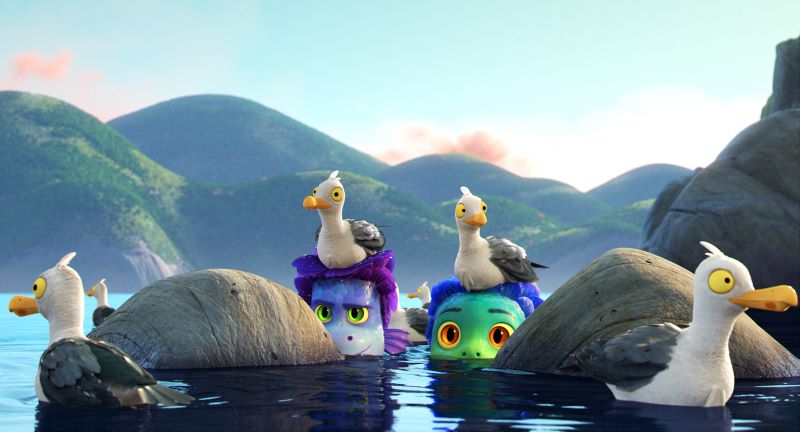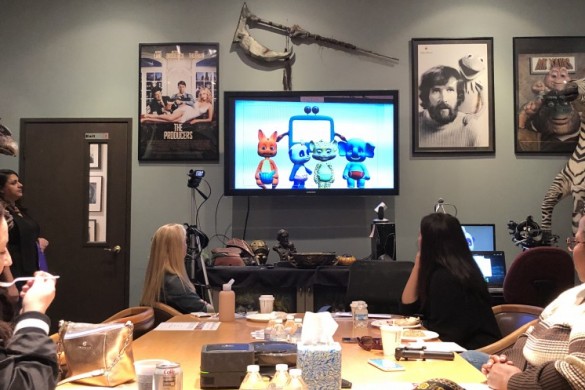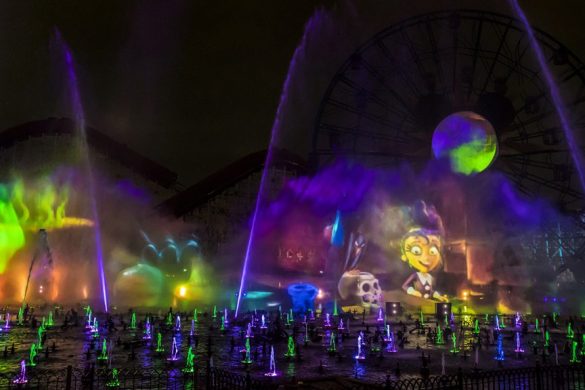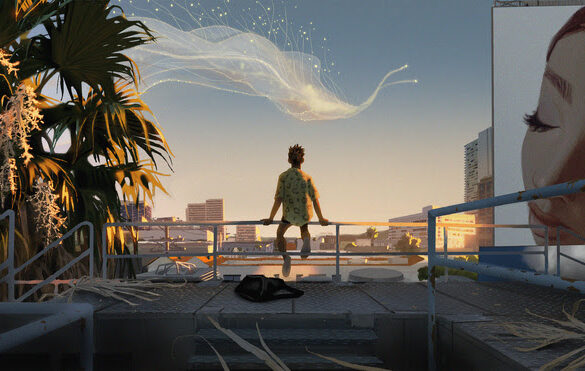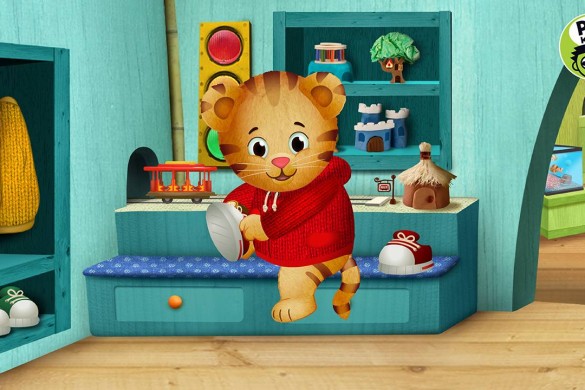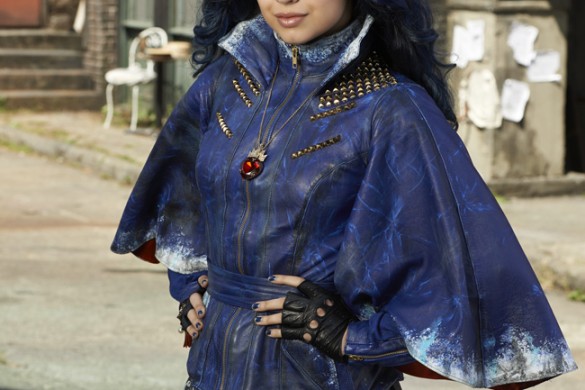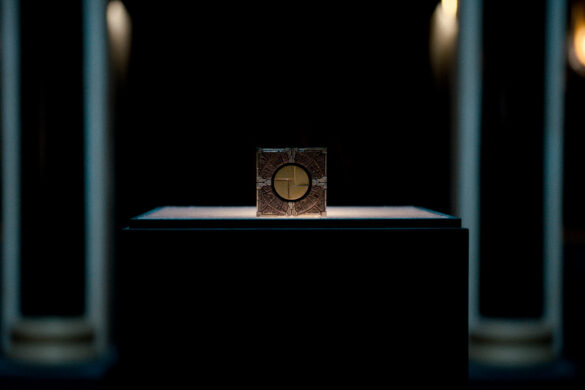So much of what makes Pixar’s films a hit is balancing out beautiful realism in its visuals to the screen while also delivering a heartfelt story that connects to audiences. These ideas shine through in Luca, a breezy, sweet, and tender coming-of-age animated film that is not afraid to wear its heart on its sleeve. Directed by Enrico Casarosa, Luca is a love letter about the friendships that we make and finding the courage to venture outside of our comfort zones to make life-long memories.
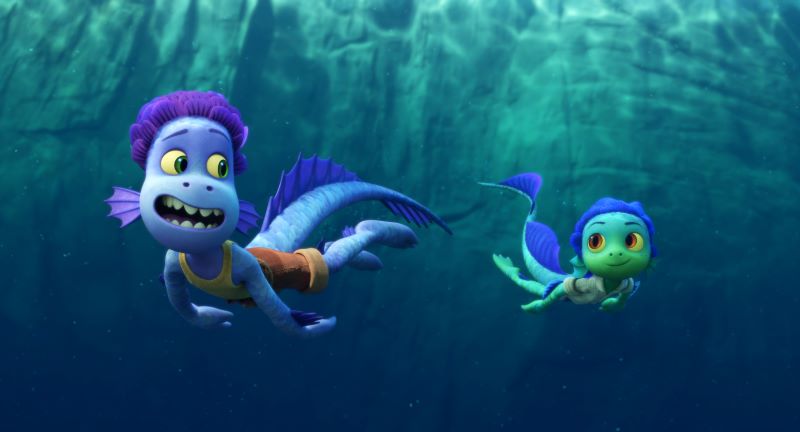
In the film, Luca (Jacob Trembly) is a young but timid shepherd of small fish beneath the waters of a tiny Italian Rivera. Having never experienced anything outside of his home, Luca dreams of experiencing life above the surface. But his parents, the stern Daniela (Maya Rudolph) and aloof Lorenzo (Jim Gaffigan), forbid him from going there. So naturally, he takes their warnings to heart, but it is all compromised when he finds trinkets like clocks and wrenches.
Finding these trinkets only increases his curiosity to go above the surface, but the idea of what would happen if he goes against his mother’s wishes prevents him from doing so. Still, he can’t help himself but be consumed by seeing the unknown, and it reaches the point where he starts to dream about it.
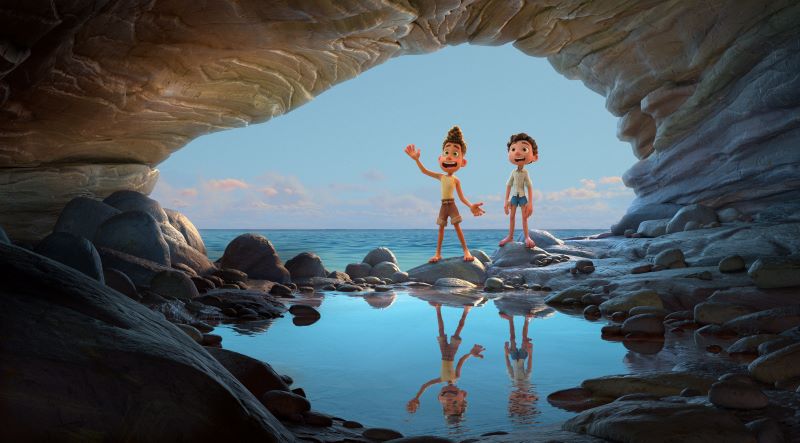
But it takes a new friend, Alberto (Jack Dylan Grazer), a free-spirited sea monster filled with enthusiasm and a drive to explore the human world , to encourage him to surface finally. Once Luca contacts the air, he undergoes a transformation as his scales and fins into human flesh and bone. Conversely, should either of them get wet from water, they revert to their sea monster forms.
The two share a secluded tower on a remote island as a hideaway to get away from their authoritative figures. There, Alberto teaches Luca to walk like a human and about the origins of the stars in the sky. But the one thing that has them surfacing all the time is the dream of owning a Vespa. And through that commonality, Alberto helps Luca find the courage to venture outside of his comfort zone even further. “Silencio Bruno,” Alberto shouts as he grabs Luca and goes down a hill riding on a makeshift Vespa that they’ve built using boxes and spare wheels. They may have a few mishaps going down the hill as their Vespa falls apart, but they are having a lot of fun doing it and getting a laugh as they try to take their Vespa to new nights.
However, if Luca and Alberto are going to live out their dreams to the fullest and get a real Vespa to see the world, they will have to swim to Portorosso. The neighboring seaport is a sport steeped with Italian culture in its architecture, food, landscape, music, and people. However, a place whose people are very superstitious of sea monsters and lives by the idea that if it swims, they kill it – as noted by the sculptures of its people killing sea creatures.
The two manage to blend into the crowd so they can get a lay of the land. They snack on gelato, gorge out on pasta, make friendly conversation with the locals – which doesn’t end well in some instances. The newcomers eventually Saverio (Ercole Visconti), the town bully and five-time winner of the Portorosso Cup race. Completely ignorant of his rep, the two get into a confrontation that nearly reveals Luca’s true form. But they are saved by the brave Giulia (Emma Berman), and outgoing and charming adventurer with a love of books and learning.
Guilia firmly believes that underdogs such as herself, and Luca and Alberto, need to stick together and stand up to bullies like Saverio. And so, she teams up with her new friends to work for her father to earn enough money to pay for a spot to race in the Portorosso Cup. And there’s an incentive for the three. For Luca and Alberto, it’s earning the prize money so that they can buy a Vespa, and for Guiliana, it’s the right to say she beat the arrogant Saverio. While this is a team effort, Luca and Alberto’s friendship will be put to the test as priorities shift and conflicts arise.
The real beauty of “Luca” lies within its simplicity, both in the storytelling and its visuals. But it is not a determent to the film as the expressiveness of its characters and the use of vibrant and warm colors accentuate the film’s themes of friendship. And it is through the child-like adventures that Luca is finally able to see the world through his eyes.
By going to the surface, it Luca’s one chance to find out who he is and what he is made of. Something he could not do had he simply obeyed his parents orders or succumb to his fears and preconceived notions of the surface world that hates sea monsters. Of course, Luca’s parents’ ignorance comes from a place of love and protection for a child. They go on about how surface dwellers are dangerous and even makes threats to send him away as a form of punishment. And despite his introverted nature, there is nothing stopping Luca from satisfying his curiosity.
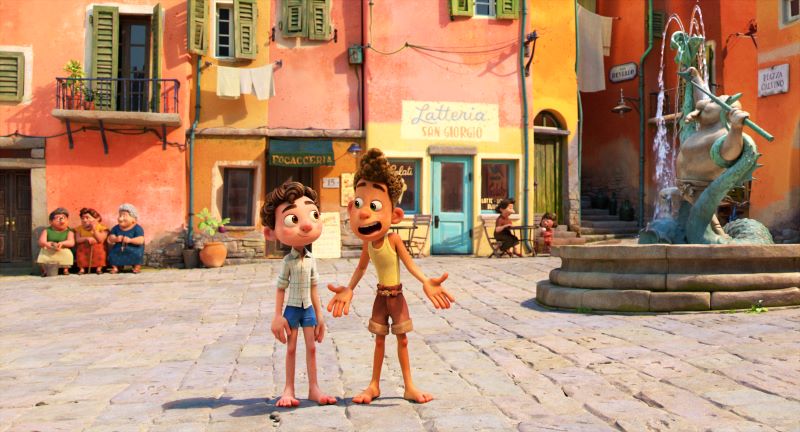
With some help from Alberto, Luca finally finds himself walking amongst the humans and experiencing the new sensory and social joys. It literally turns “Luca” into a fish out of water story as both of them are walking amongst the humans for the very first time and experience the joys of eating delicious foods and making new friends, while also experiencing the consequences of breaking the rules or making rude comments to their elders.
It’s through these adventures that allows Luca t overcome his anxiety and confidence issues, as well as forge his own identity. For so long he’s been bound by his parents fears of the outside world. Additionally, Alberto’s attachment and jealousy towards Guiliana prevents Luca from being the best version of himself. As such, he discovers there is a lot more to life than just riding off on a Vespa to see the world.
While Luca does not have some of the maturity or thematic depth as some of Pixar’s previous films, it does embrace that age of innocence and viewing the world through the lens of the child. “Luca” is viewed through the lens of a child, as such there is a charm and warm to the imperfections, and it works well with the playfulness and silliness to a point where the laughter has some of the older members of the audience recall their own adventures during summer vacation.
“Luca” is a playful world inhabited by adventurers, dreamers and explorers. Much of that comes alive through Casarosa visualizing Luca’s vivid imagination running wild in various dream sequences of himself running on the rings of Saturn, building up speed on his Vespa to launch himself to the stars, or being showered with an abundance of prize money. It may be silly, but it is visualizes the importance of having life-changing experiences and making friendships that have an impact on one’s identity.
And that child-like sense of wonder the film has is elevated with Dan Romer’s score. One can’t help but feel transported to the Italian seaside port where its people treats you like family and there is no shortage of beautiful music and tasty food.
So even though the photorealistic detail present in some of Pixar’s previous films are noticeably absent in “Luca,” and some of the aspects of the story aren’t layered, the film makes a connection through its resonating themes and visuals. A lot of that has to do with how deeply personal the film is to Casarosa, who based much of the film on his own childhood. As such, a lot of it has a child-like simplicity to it, and yet, it still is able to connect to its audience because of those emotionally resonating themes of friendship and identity.
Luca exclusively on Disney+ for all subscribers on June 18.
8.5/10

